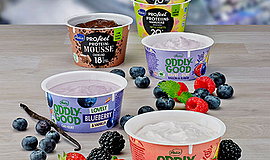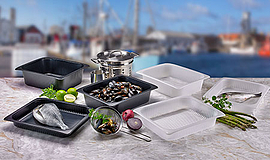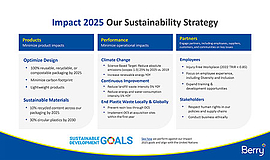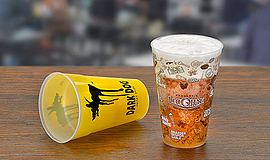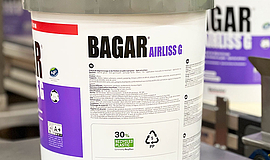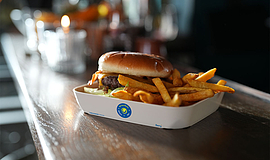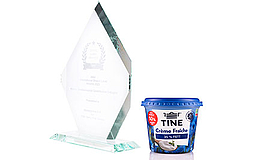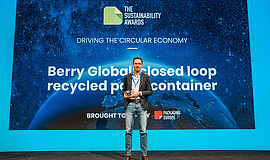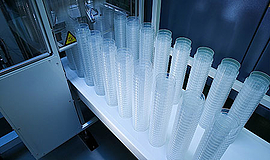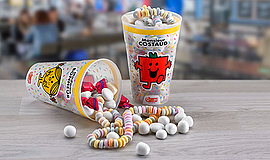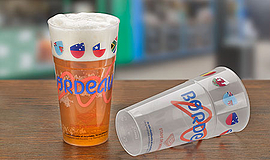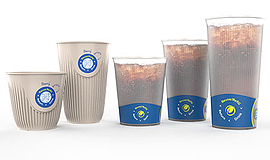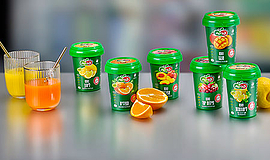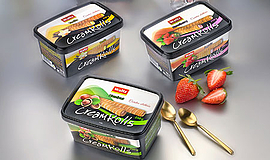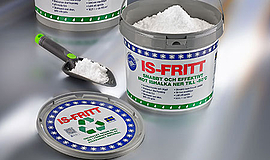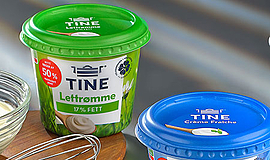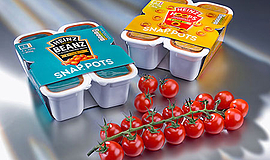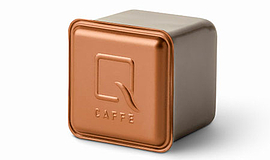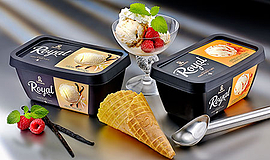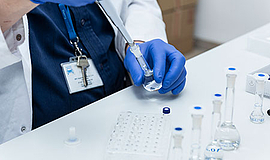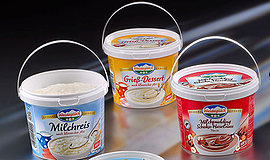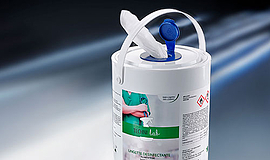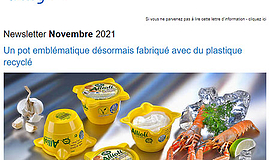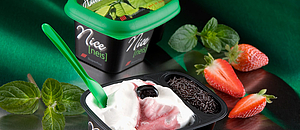-
Packaging for ice cream wins international acclaim
Norwegian ice cream producer Diplom-Is wins the international award for best packaging solution, which is produced by Berry Superfos.
-
Berry Superfos website is moving to a new home soon!
Berry Superfos website will be relocating to our parent company’s website, Berry Global, at berryglobal.com later this year.
-
New pudding pot extends shelf life and saves on plastic
Valio is launching a new pot for its protein puddings. It combines cardboard and plastic with a unique coating to ensure a 120-day shelf life.
-
New versatile tray range
Berry Superfos introduces the ½ Gastro tray range, offering exceptional versatility in depth, volume, and colour, catering to diverse needs across the food industry.
-
Berry Superfos advances circular economy goals with new initiatives
Aiming for 100% reusable, recyclable, or compostable packaging by 2025, Berry Superfos is set to remove metal handles and the colour carbon black in 2024.
-
Renowned brewery chooses the reusable SuperCup
The French brewery Brasserie Licorne, known for its unicorn-themed branding, has opted for the SuperCup for serving its quality beers, ciders and energy drinks.
-
Beissier switches to 30% recycled plastic
French plaster producer Beissier has transitioned one of its product lines to SuperLift® containers made with 30% recycled plastic and featuring the RecyClass label.
-
Berry Superfos launches Reusable Tableware Range for the food service industry
Read about our new revolutionary range of reusable bowls and lids, redefining the way restaurant food is served, enjoyed and packaged.
-
Re-designed cups for dairy producer TINE win their second award
The recyclable sleeve on Berry Superfos cups for TINE, a Norwegian dairy leader, won the 2023 AWA International Award.
-
Berry Superfos wins two more prestigious awards for recycling project
The closed-loop system project by Berry Superfos, aimed at recycling paint containers, has now been honoured with five distinct awards for its innovative circular solution.
-
Berry Superfos leads the way in food safety
Via BRC certification and other measures, we remain committed to maintain high standards of hygiene and quality for food packaging
-
A perfect cup for confectionery and fun
Originally designed for beverages, the reusable SuperCup has just made its debut in the confectionery market.
-
The reusable SuperCup is attending the Rugby World Cup
InfinyCup has partnered with Berry Superfos to equip two major stadiums with the reusable SuperCup for beer and soft drinks during the 10th Rugby World Cup held in France.
-
Elevate your brand with the new reusable Berry Cup Range for hot and cold drinks
Now you can switch from single-use to reusable cups for your brand with the new stylish and functional Berry Cup Range.
-
Bring your next packaging project to life, enhance your creativity and drive packaging innovation with the Berry Superfos 3D Design Studio
Register now to save time and unleash your creativity.
-
Freezer-safe packaging for fruit juice concentrates
Gat Foods, supplier for the global beverage industry, has chosen Berry Superfos as packaging partner for its fruit juice concentrates to ensure freezer safety.
-
We are extremely satisfied with the quality and design of the UniPak container
Bajro Ćatić, CEO of Ćatić Company which recently switched to UniPak for its popular Waltz cream rolls.
-
We decided to stay with the SuperLift® container but change its composition to include recycled content
CEO Alexander Axelsson, Everbrand, about the switch to PCR-content containers for IS-FRITT de-icing products.
-
We want all our packaging to be made of renewable or recycled material by 2025. Our new pot for three of our products is an important step towards this goal.
Bjørn Malm, head of sustainability at dairy company TINE
-
Heinz and Tesco launch pioneering recycling project
Berry Global is part of a first of its kind pilot project launched by Heinz and Tesco to recycle more soft plastics in the United Kingdom.
-
Qbo coffee switches to coffee capsules made from renewable materials
German coffee producer Tchibo chose Berry Superfos to produce coffee capsules made from renewable materials for their Qbo brand.
-
Non-carbon is the new black
Ice cream producer Diplom-Is makes recycling possible by opting for a new non-carbon black colour for its containers.
-
Our customers will benefit from faster testing of raw materials for food product packaging
The new Berry Superfos testing laboratory has obtained accreditation in the field of chemical testing and sampling of plastic products.
-
19% weight reduction for yoghurt and desserts packaging
For sustainability reasons, dairy producer Milchwerke Schwaben joined forces with Berry Superfos to reduce the weight of their 1 kg packaging.
-
Iconic pot for Allioli garlic mayonnaise now includes 25% recycled polypropylene
Food producer Choví launches more sustainable packaging developed in partnership with Berry Superfos
-
The wet wipes container is outstanding: airtight, durable and reusable
Hitam in France is impressed with the design expertise of Berry Superfos.
-
Sign up for our newsletter
Contact us here:
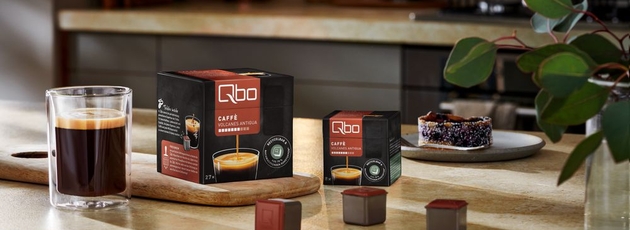
Qbo coffee switches to coffee capsules made from renewable materials
Coffee capsules are becoming more and more popular around the world. They are practical and offer a great cup of coffee, particularly when the coffee is from a premium brand like Qbo. The downside is the environmental footprint of coffee capsules as they generate a lot of packaging waste and have traditionally been made of virgin polypropylene material.
Recently, German coffee producer Tchibo set out to do better. The company wanted to change the material composition of its Qbo brand capsules to improve their sustainability. The first step was to team up with the producer of their capsules, Berry Superfos, and the Finish feedstock supplier, Neste, to explore what could be done. Now, a year or so later, Tchibo has introduced an innovative coffee capsule, made with second-generation renewable and recycled raw materials.
“While our Qbo capsules are still made of polypropylene (PP), now the PP is produced from 70% renewable raw materials instead of virgin fossil oil as is normally the case for coffee capsules. Our new capsules are not only made from renewable materials. This makes the entire Qbo range – containing sustainably grown Qbo coffee brewed in Qbo machines – one of the most sustainable capsule systems on the market,” says Marius-Konstantin Wiche, development manager, capsule & innovation at Tchibo.
Waste becomes capsules
The change to the Qbo capsules with their unique cubic shape is invisible to the naked eye. So what has really changed? Marius-Konstantin Wiche explains:
“We needed to ensure that the high quality and great taste of the Qbo coffee would not be affected. That’s why we focused on replacing the raw materials for the capsules, not the PP itself. We now use so-called second-generation renewable raw materials – i.e. organic waste and by-products, such as tall oils from forestry, waste fats from the fast-food industry and vegetable fats from cooking oil production. These materials go into producing PP polymers with the same quality as virgin PP; you won’t see or taste any difference.”
A strong trio of partners
Tchibo trusted their long-term capsule provider Berry Superfos to be a key partner in this project, alongside feedstock producer Neste.
“We chose Berry Superfos for this project as they have experience with our product and hold the required ISCC PLUS certification to produce the capsules from renewable materials. Their knowledge of foil extrusion and thermoforming for our capsules is excellent and we also appreciate their inhouse engineering and machining of related parts for our products.”
“Together, our Tchibo team, Neste and Berry Superfos have created a fantastic result; the Qbo coffee still maintains its premium quality, but now in a capsule produced with less CO2 emissions,” Marius-Konstantin Wiche concludes.
Want to know more?

- Matthias Michaelis
- Sales Director
- Coffee Capsules
- Food Service
- Phone: +49 160 8365197
Hi, I’m EasySnacking.

I’m perfect for meals on the run. Grab me and go – I even come with a sleek spoon in my lid. Get to know me better...
Would you like to be contacted?
- Berry Superfos
- Head Office
- Spotorno Allé 8
- DK-2630 Taastrup
- Denmark
- General Inquiries
- E-mail: Superfos@berryglobal.com
- Phone: +45 5911 1110
- Fax: +45 5911 1180
- Sales Inquiries
- E-mail: SuperfosSales@berryglobal.com
- Phone: +45 5911 1110
- Fax: +45 5911 1180



